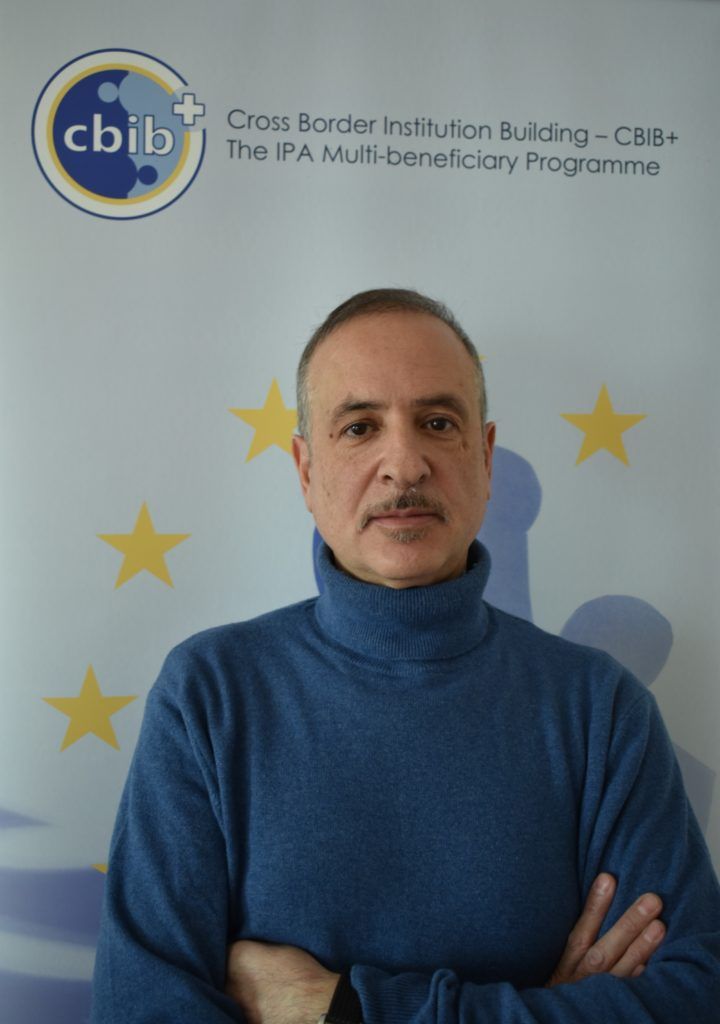Voices from the field
Vasileios Vasilatos
"Strategies, mechanisms, grant schemes... it sounds complex, but it all aims at improving life for the communities"
I am Greek and I am the Team Leader of the Cross Border Institution Building Plus (CBIB+) project, currently in its third phase. CBIB+ is an EU-funded regional technical assistance project to cross-border cooperation (CBC) between IPA beneficiary countries (Albania, Bosnia and Herzegovina, Montenegro, North Macedonia, Serbia, as well as Kosovo*). The project is managed by DG NEAR and its purpose is to enhance regional coordination and harmonisation of approaches and mechanism in the field of cross-border cooperation at inter-Western Balkan border, in line with EU frameworks and guidelines, as well as improve the technical capacities of the management structures and the quality of the CBC operations.
I have practically spent most of my professional life in the CBC arena by supporting or managing programmes and projects: establishing relevant CBC structures, designing and conducting appropriate training, preparing strategic plans, programming documents, designing appropriate CBC grants schemes, monitoring and evaluation of the programmes and projects, impact and final assessments.
We are currently supporting the implementation of nine IPA 2014-2020 CBC programmes running under different management modes (some of them are under indirect and the other under direct). At the same time, the capacities of the relevant programme management structures are not at the same level. Therefore, harmonisation of the approaches and mechanisms of CBC programmes and keeping all the programmes progressing with the same pace is one of the major challenges.
Our project is also investing a lot of efforts in order to improve the visibility and communication activities of IPA CBC programmes.
To address these challenges, different training modules were designed and implemented in all countries/programmes, various surveys conducted, regional meetings organised and guiding note for CBC project beneficiaries developed.
Furthermore, the project is using different online tools to promote on both WB and EU level the results of implementation of the IPA CBC programmes (project website, newsletter Yellow&Blue, monthly flash news, best case database, KEEP, etc.).
During the European Week of Regions and Cities 2018, our project has organised in close cooperation with Interact, DG REGIO and DG NEAR the workshop ‘Instrument for Pre-Accession cooperation programmes enhancing enlargement agenda’. During this workshop, three projects united under the ‘Via Dinarica’ concept and implemented under the IPA 2007-2013 CBC programmes were presented. The workshop was very successful and demonstrated a high interest from the audience, which is encouraging future initiatives of the kind.
I am convinced the projects are the driving force of the IPA CBC programmes. They are the most important link in the CBC chain for every single aspect of programme: efficiency and effectiveness of programme implementation as well as programme promotion. Therefore, the targeted and guided assistance to the beneficiaries of these projects is the key.
The IPA CBC programme budgets are pretty modest and subsequently the budgets of the most of the projects were and still are very limited, but certain projects like Marubi, implemented under IPA 2007-2013 CBC programme Albania – Montenegro, or the four projects united under ‘Via Dinarica’ mega trail concept (implemented under three IPA 2007-2013 and one IPA 2014-2020 CBC programmes) managed with fairly small ‘envelope’ to reach high visibility even on EU level. The routes of the Via Dinarica mega trail are attracting a lot of citizens from the EU and will highly contribute to the sustainability of these projects’ results, but also to the promotion of the relevant programmes.
For me a ‘good’ cross-border project is the one where the partners work together in jointly addressing the challenges that local communities (on both sides of the border) are facing together. Only if the project team members act as there was no border dividing them, and if they see the entire programme area as one territory, the impact of the actions financed will have added value. Only then our CBC programme border will be the one connecting and not dividing people.
For the future, I sincerely hope that, while incorporating lessons learned from the previous periods (2007-2013 and 2014-2020), we will be able to bring these programmes to a new level of implementation: desirable additional simplification of the applicable rules and procedures for both structures and beneficiaries and more efficient performance framework. At the same time, I hope that the activities financed by these programmes will bring closer people living in the local communities across the border and help them in better addressing the common challenges jointly. Thus, this will definitely have direct impact on achieving not only each programme’s objective but rather the objective of the IPA itself: economic development and reconciliation.
* This designation is without prejudice to positions on status, and is in line with UNSCR 1244 and the ICJ Opinion on the Kosovo declaration of independence
Vasileios Vasilatos has a diploma in Chemistry, at the University of Athens. He also studied Chemical Engineering, followed by two postgraduate degrees in Energy and Environment at the Royal Institute of Technology in Stockholm, Sweden. His CBC experience started more than 20 years ago, in the beginning of the 1990’s with EU Phare CBC programme Greece – Bulgaria followed by CBC programme Greece – North Macedonia and several other CBC activities throughout these years throughout neighbouring countries… Continuing in the new millennium with some project activities within and beyond the Western Balkan region.




















